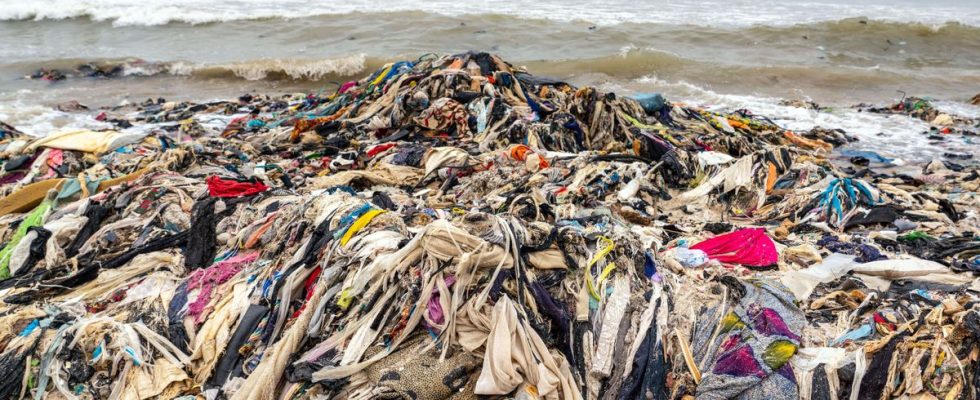Zara, H & M, Gap, Uniqlo, Mango, Urban Outfitters… All these brands are now among the 30 fast fashion brands banned from resale on the website. Collective locker room. The world’s leading luxury fashion resale platform announced, on November 16, in a press release, its new initiative aimed at fighting fast fashion. This initiative is a continuation of the site’s commitment to a circular economy, announced in 2022, highlighting the desire to increase customer awareness through ethical consumption. This Friday, November 24, another campaign entitled “Think First, Buy Second”, which aims to transform Black Friday into “Better Friday”, was also launched by the site in order to raise awareness its consumers.
Who was banned from the Collective Locker Room?
Vestiaire Collective asked nine sustainable fashion experts to precisely define the fast fashion brands it wants to ban. Orsola de Castro of Fashion Revolution, Rachel Cernansky of Vogue Business, Christina Dean of Redress, Eva Kruse of Pangaia, and Liz Ricketts of The Or Foundation, as well as key figures from “Second Hand or Nothing” such as Lauren Singer, François Souchet , Lucianne Tonti and Matteo Ward, contributed their knowledge to define unethical brands. Five criteria emerged: low prices, high renewal rate, breadth of the product range, speed to market and recurring brand promotions. These elements led to the establishment of a list of 30 fast fashion brands which have been banned from the site.
Excluded brands include Abercrombie & Fitch, American Apparel, Asos, Atmosphère, Benetton, Bershka, Boohoo, Burton, Calzedonia, Christopher Kane for Topshop, Cider, Coast, Debenhams, Desigual, Disney, Dorothy Perkins, Fashion Nova, Forever 21, Gap , H & M, Hollister, Intimissimi, Jennyfer, Karen Millen, Kate Moss for Topshop, Mango, Marques’Almeida for Topshop, Mary Katrantzou for Topshop, Miss Selfridge, Missguided, Misspap, Monki, NA-KD, Nasty Gal, New Look , Oasis, Old Navy, Only, OVS, Oysho, Piazza Italia, PrettyLittleThing, Primark, Pull & Bear, Reserved, Shein, Stradivarius, Tally Weijl, Tezenis, Tom Tailor, Topman, Topshop, Topshop Unique, Topshop Boutique, Topshop x JW Anderson, US Polo Assn., Uniqlo, Urban Outfitters, Vero Moda, Wallis, Warehouse, Weekday and Zara.
Faced with the 92 million tonnes of textile waste produced each year, Vestiaire Collective recognizes that banning its brands alone is not enough. So, the platform launched an educational journey for its buyers and sellers to raise awareness of alternative practices, encouraging critical reflection on consumption habits.
An initiative appreciated or hated by their client
Customer reactions to a recent decision by the second-hand platform are mixed. Some welcome the initiative, while others express reservations.
Prune, participant in a survey of 20 minutes underlines the financial constraints involved in this type of decision: “I don’t have the means to be ethical, even if I wanted to. I’m looking for products priced at €2 or €3, with shipping costs already weighing heavily. As for the “quality stands the test of time” argument… My son changes sizes at least once a year, he doesn’t even have time to wear them out! For me, you have to have the means to have these kinds of thoughts,” she confides to 20 minutes.
However, some people see this new direction favorably, like Charles-Aymeric, a regular customer of Vestiaire Collective: “I think it’s a good idea. I use second-hand applications like Vestiaire Collective to buy clothes from specific collections, with the aim of collecting and preserving them. Clothes that come from fast fashion clutter up the catalog a bit and complicate the search. On second-hand platforms, fast fashion clothing already appears quite worn. Perhaps the ban on reselling fast fashion clothing will help regulate the purchase of this type of clothing. »
Despite these divergent opinions, Vestiaire Collective remains committed to its ecological approach. The platform wants to encourage its sellers to adopt sustainable practices such as upcycling, exchanging, donating, and recycling their fast fashion clothing, rather than reselling them. One more step in the fight for more environmentally friendly fashion.

